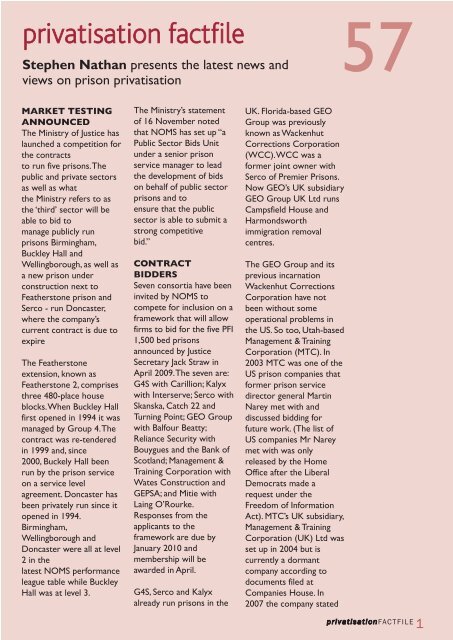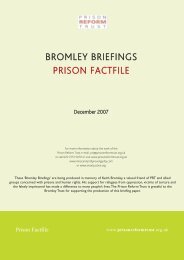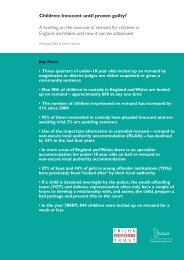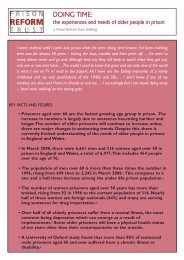57 privatisation factfile - Prison Reform Trust
57 privatisation factfile - Prison Reform Trust
57 privatisation factfile - Prison Reform Trust
Create successful ePaper yourself
Turn your PDF publications into a flip-book with our unique Google optimized e-Paper software.
<strong>privatisation</strong> <strong>factfile</strong><br />
<strong>57</strong><br />
Stephen Nathan presents the latest news and<br />
views on prison <strong>privatisation</strong><br />
MARKET TESTING<br />
ANNOUNCED<br />
The Ministry of Justice has<br />
launched a competition for<br />
the contracts<br />
to run five prisons. The<br />
public and private sectors<br />
as well as what<br />
the Ministry refers to as<br />
the ‘third’ sector will be<br />
able to bid to<br />
manage publicly run<br />
prisons Birmingham,<br />
Buckley Hall and<br />
Wellingborough, as well as<br />
a new prison under<br />
construction next to<br />
Featherstone prison and<br />
Serco - run Doncaster,<br />
where the company’s<br />
current contract is due to<br />
expire<br />
The Featherstone<br />
extension, known as<br />
Featherstone 2, comprises<br />
three 480-place house<br />
blocks. When Buckley Hall<br />
first opened in 1994 it was<br />
managed by Group 4. The<br />
contract was re-tendered<br />
in 1999 and, since<br />
2000, Buckely Hall been<br />
run by the prison service<br />
on a service level<br />
agreement. Doncaster has<br />
been privately run since it<br />
opened in 1994.<br />
Birmingham,<br />
Wellingborough and<br />
Doncaster were all at level<br />
2 in the<br />
latest NOMS performance<br />
league table while Buckley<br />
Hall was at level 3.<br />
The Ministry’s statement<br />
of 16 November noted<br />
that NOMS has set up “a<br />
Public Sector Bids Unit<br />
under a senior prison<br />
service manager to lead<br />
the development of bids<br />
on behalf of public sector<br />
prisons and to<br />
ensure that the public<br />
sector is able to submit a<br />
strong competitive<br />
bid.”<br />
CONTRACT<br />
BIDDERS<br />
Seven consortia have been<br />
invited by NOMS to<br />
compete for inclusion on a<br />
framework that will allow<br />
firms to bid for the five PFI<br />
1,500 bed prisons<br />
announced by Justice<br />
Secretary Jack Straw in<br />
April 2009. The seven are:<br />
G4S with Carillion; Kalyx<br />
with Interserve; Serco with<br />
Skanska, Catch 22 and<br />
Turning Point; GEO Group<br />
with Balfour Beatty;<br />
Reliance Security with<br />
Bouygues and the Bank of<br />
Scotland; Management &<br />
Training Corporation with<br />
Wates Construction and<br />
GEPSA; and Mitie with<br />
Laing O’Rourke.<br />
Responses from the<br />
applicants to the<br />
framework are due by<br />
January 2010 and<br />
membership will be<br />
awarded in April.<br />
G4S, Serco and Kalyx<br />
already run prisons in the<br />
UK. Florida-based GEO<br />
Group was previously<br />
known as Wackenhut<br />
Corrections Corporation<br />
(WCC). WCC was a<br />
former joint owner with<br />
Serco of Premier <strong>Prison</strong>s.<br />
Now GEO’s UK subsidiary<br />
GEO Group UK Ltd runs<br />
Campsfield House and<br />
Harmondsworth<br />
immigration removal<br />
centres.<br />
The GEO Group and its<br />
previous incarnation<br />
Wackenhut Corrections<br />
Corporation have not<br />
been without some<br />
operational problems in<br />
the US. So too, Utah-based<br />
Management & Training<br />
Corporation (MTC). In<br />
2003 MTC was one of the<br />
US prison companies that<br />
former prison service<br />
director general Martin<br />
Narey met with and<br />
discussed bidding for<br />
future work. (The list of<br />
US companies Mr Narey<br />
met with was only<br />
released by the Home<br />
Office after the Liberal<br />
Democrats made a<br />
request under the<br />
Freedom of Information<br />
Act). MTC’s UK subsidiary,<br />
Management & Training<br />
Corporation (UK) Ltd was<br />
set up in 2004 but is<br />
currently a dormant<br />
company according to<br />
documents filed at<br />
Companies House. In<br />
2007 the company stated<br />
<strong>privatisation</strong>FACTFILE<br />
1
2<br />
priva tis atio nFACTFILE<br />
that it had not traded<br />
since 31 December 2005<br />
and that “there is<br />
uncertainty about its<br />
ability to continue as a<br />
going concern.”<br />
MTC’s parent company<br />
has prison contracts in the<br />
US and Australia. In<br />
Ontario, Canada, the<br />
company lost a contract<br />
to manage the Central<br />
North Correctional<br />
Centre after the provincial<br />
government decided that<br />
there was “no appreciable<br />
benefit” of having the<br />
prison privately managed<br />
compared to a similar<br />
public facility. The company<br />
disputed the government’s<br />
finding. The government of<br />
Costa Rica signed a $73<br />
million deal with MTC for<br />
a PFI prison but<br />
subsequently pulled out<br />
after finding that it could<br />
build 2,600 bed public<br />
prison for just $10m. The<br />
government and MTC<br />
have since been battling<br />
over compensation. In<br />
2008 Wates produced a<br />
design for a 2,500 bed<br />
‘titan’ prison that would<br />
deliver savings in “build<br />
costs, maintenance,<br />
running costs and staffing.”<br />
In France GEPSA, a<br />
subsidiary of the water<br />
and waste services<br />
multinational Suez, has<br />
maintenance contracts<br />
providing technical and<br />
social services at 15 semiprivate<br />
prisons. GEPSA<br />
claims that prisoners who<br />
receive its Tuteur de<br />
Projet Professionnel (TPP)<br />
employment programme<br />
are re-imprisoned at the<br />
rate of 10% compared to<br />
16% for prisoners who do<br />
not have the help of TPP.<br />
So far Reliance has no<br />
prison contracts but is<br />
deeply involved in the UK<br />
criminal justice system<br />
(also see Money Go<br />
Round below). Reliance<br />
Secure Task Management<br />
Ltd’s contracts include:<br />
prisoner escort in<br />
England, Wales and<br />
Scotland; juvenile prisoner<br />
escort for the Youth<br />
Justice Board in England<br />
and Wales; transportation<br />
of confidential documents<br />
for the <strong>Prison</strong> Service;<br />
delivery and collection of<br />
forensic items for the<br />
Forensic Science Service;<br />
and 30 custody centres<br />
for various police forces.<br />
Bouygues is a French<br />
multinational construction<br />
company that, since 2004<br />
has won contracts to<br />
design and build six<br />
prisons in France. In 2008<br />
the company also won a<br />
27-year contract to<br />
finance, design, build,<br />
maintain and operate noncustodial<br />
services in three<br />
new prisons.<br />
Mitie is a multinational<br />
facilities management<br />
company whose<br />
services included<br />
security. The company is<br />
described in its 2009<br />
annual report as “the<br />
largest PFI FM [Facilities<br />
Management] education<br />
services provider in the<br />
UK.” Three years ago it<br />
bought the manned<br />
guarding business of<br />
Rentokil. Its contracts<br />
include providing front<br />
of house, access<br />
control, cctv<br />
monitoring, jury<br />
supervision and car<br />
park management at<br />
425 crown, county,<br />
magistrates and tribunal<br />
courts in England and<br />
Wales as well as<br />
security at Eurostar<br />
terminals, airports and<br />
the Tate Britain gallery.<br />
According to Mitie’s<br />
website, “In all sorts of<br />
sectors and across<br />
10,000 sites in the UK,<br />
our industry accredited<br />
officers are bursting<br />
with energy and a cando<br />
attitude. Combine<br />
that with our electronic<br />
security and we make<br />
sure nothing is left to<br />
chance. So whether it’s<br />
a warehouse that needs<br />
patrolling, a car park<br />
that needs monitoring<br />
or visitors that need to<br />
be greeted with a<br />
professional welcome,<br />
we’re the ones to call.”<br />
A current<br />
advertisement for a<br />
court security officer<br />
employed by Mitie in<br />
Redditch,<br />
Worcestershire, offers a<br />
salary of £6.10 per<br />
hour.<br />
New prison sites<br />
identified so far are at the<br />
former Runwell secure<br />
psychiatric hospital in<br />
Essex, and at a former<br />
Ford factory site at<br />
Dagenham where the<br />
Ministry of Justice has<br />
launched local<br />
consultation. Dagenham<br />
MP Jon Cruddas is<br />
involved in a campaign<br />
against the prison being<br />
located in the area and, as<br />
at 21 October, some 9,000<br />
people had signed a
petition opposing the<br />
government’s plan. The<br />
local council also has<br />
alternative plans for the<br />
site.<br />
Justice Minister Maria<br />
Eagle announced that a<br />
search for locations for<br />
three other prisons will be<br />
focused on London,<br />
North-west England and<br />
West Yorkshire. “Finding<br />
the most appropriate<br />
place for a new prison is<br />
of paramount importance.<br />
They should be located in<br />
those areas where there is<br />
the greatest need, and<br />
where the greater number<br />
of prisoners come from,”<br />
she said in a media<br />
release, 27 October 2009.<br />
CONSTRUCTION<br />
NEWS<br />
Construction firms<br />
Interserve, Carillion and<br />
Balfour Beatty - all invited<br />
by NOMS to compete to<br />
be included in the<br />
framework agreement to<br />
bid for he next round of<br />
PFI prison contracts - have<br />
been fined by the Office of<br />
Fair Trading (OFT) for<br />
infringing competition law<br />
by rigging bids or cover<br />
pricing. Interserve was<br />
fined £11.6 million,<br />
Carillion £5.4 million and<br />
Balfour Beatty £5.2 million<br />
respectively.<br />
Bid rigging is when firms<br />
submit artificially high<br />
prices to give the<br />
semblance of competition.<br />
According to the OFT’s<br />
press release 22<br />
September 2009, cover<br />
pricing is “when one or<br />
more bidders in a tender<br />
process obtains an<br />
artificially high price from<br />
a competitor. Such bids<br />
are priced so as not to<br />
win the contract but are<br />
submitted as genuine bids,<br />
which gives a misleading<br />
impression to clients as to<br />
the real extent of<br />
competition. This distorts<br />
the tender process.” The<br />
OFT also found six<br />
instances where successful<br />
bidders had paid an agreed<br />
sum of between £2,500<br />
and £60,000 to the<br />
unsuccessful bidder<br />
through the raising of false<br />
invoices.<br />
Altogether the OFT levied<br />
fines of £129.5 million on<br />
103 construction<br />
companies in England after<br />
looking at 199 tenders<br />
from 2000 to 2006. The<br />
OFT recommended,<br />
however, that the<br />
companies involved<br />
“should not be excluded<br />
automatically from future<br />
tenders on the grounds<br />
that they were parties to<br />
the decision, or be the<br />
subject of similar adverse<br />
measures making it more<br />
difficult for them to qualify<br />
for such tenders.”<br />
PFI contracts were not<br />
included in the OFT’s<br />
investigation. It remains to<br />
be seen whether these will<br />
be subject to a similar<br />
investigation. More details:<br />
www.oft.gov.uk/oft_at_work/<br />
enforcement_regulation/Cart<br />
els/construction/<br />
MONEY GO ROUND<br />
Reliance Secure Task<br />
Management Ltd is a<br />
subsidiary of Reliance<br />
Corporation Ltd. In<br />
Reliance Secure Task<br />
Management Ltd’s latest<br />
accounts the principal<br />
activity is described as<br />
“the provision of business<br />
process outsourcing<br />
services to the criminal<br />
justice sector, including<br />
prisoner escorting, court<br />
and police custody<br />
management, secure<br />
logistics, offender<br />
supervision, resource<br />
solutions and<br />
infrastructure<br />
management delivered<br />
through Private Finance<br />
Initiatives.” For the<br />
financial year ended 24<br />
April 2009 the company a<br />
pre-tax profit £7.23<br />
million (2008: £5.76<br />
million) on turnover of<br />
£95.9 million (2008:<br />
£88.18 million). The<br />
accounts note that “a key<br />
measurement of the<br />
effectiveness of the<br />
company’s operations” is<br />
the operating profit<br />
margin which increased to<br />
7.5% of turnover from<br />
6.0% as a result of the<br />
increase in turnover,<br />
changes in the mix of<br />
contracts and continued<br />
focus on operational and<br />
cost efficiencies.” No<br />
dividends were paid in<br />
respect of the financial<br />
year (2008: £3 million).<br />
The company employed an<br />
average of 2,584 people in<br />
operations and<br />
administration with a<br />
further 186 office and<br />
management staff (2008:<br />
2,441 and 197). The<br />
directors’ total<br />
remuneration was<br />
£565,344 (2008 £369,792).<br />
The highest paid director<br />
earned £178,793 (2008:<br />
£217,248).<br />
<strong>privatisation</strong>FACTFILE<br />
3
4 <strong>privatisation</strong>FACTFILE<br />
Premier Custodial<br />
Finance Ltd’s principal<br />
activity is to provide<br />
finance to its fellow group<br />
companies, namely<br />
Kilmarnock <strong>Prison</strong><br />
Services Ltd<br />
(Kilmarnock prison);<br />
Lowdham Grange<br />
<strong>Prison</strong> Services Ltd<br />
(Lowdham Grange<br />
prison); Medomsley<br />
Training Services Ltd<br />
(Hassockfield secure<br />
training centre);<br />
Moreton <strong>Prison</strong><br />
Services Ltd (Dovegate<br />
prison); and<br />
Pucklechurch<br />
Custodial Services<br />
Ltd (Ashfield YOI). The<br />
company is owned and<br />
controlled by Barclays<br />
Integrated<br />
Infrastructure Fund<br />
LP which, according to<br />
Premier Custodial’s<br />
accounts for the year<br />
ended 31 December 2008,<br />
is in turn “owned by a<br />
number of investors, with<br />
no one investor having<br />
individual control.”<br />
Premier Custodial Finance<br />
Ltd made a pre-tax profit<br />
of £3.6 million (2007: £5.2<br />
million). Equity dividends<br />
paid during the year were<br />
£1.67 million (2007: £1.54<br />
million). Barclays<br />
Integrated Infrastructure<br />
Fund LP does not file<br />
accounts at Companies<br />
House as it is a limited<br />
partnership.<br />
The special purpose<br />
vehicle (SPV) companies<br />
formed to finance, design,<br />
build and operate<br />
Kilmarnock, Lowdham<br />
Grange, Dovegate and<br />
Ashfield prisons and<br />
Hassockfield secure<br />
training centre are all<br />
subsidiaries of I2<br />
Holdco 2 Ltd. However,<br />
at the time of writing, the<br />
latest accounts for I2<br />
Holdco 2 Ltd were listed<br />
as overdue at Companies<br />
House.<br />
Serco, the company that<br />
operates Kilmarnock,<br />
Lowdham Grange,<br />
Dovegate and Ashfield<br />
prisons and Hassockfield<br />
secure training centre,<br />
expects its share of the<br />
contract to finance, design,<br />
build and operate the new<br />
prisons at Maghull and<br />
Belmarsh West will have a<br />
combined value to the<br />
company of around £600<br />
million over 26.5 years,<br />
according to a Stock<br />
Exchange announcement<br />
on 26 August 2009.<br />
Construction by its<br />
partner Skanska is<br />
expected to start in the<br />
second half of 2010 with<br />
completion expected in<br />
the second half of 2011.<br />
Serco also extended its<br />
electronic monitoring<br />
contract in England and<br />
Wales by a further two<br />
years to March 2012 and<br />
secured additional revenue<br />
of around £70 million<br />
from this.<br />
Revenues and profits of<br />
G4S will be boosted by<br />
recent contracts. The<br />
operation of Brook House<br />
and Tinsley House<br />
immigration detention<br />
centres will earn £10<br />
million and £5 million per<br />
year respectively.<br />
Meanwhile, the extension<br />
of the company’s<br />
electronic monitoring<br />
contract for a further two<br />
years, is worth £40 million<br />
a year.<br />
Peterborough <strong>Prison</strong><br />
Management Ltd is<br />
the SPV company that was<br />
set up to finance, design,<br />
build and run<br />
Peterborough prison. The<br />
25 year contract with the<br />
Home Office was signed<br />
in February 2003. The<br />
company is jointly owned<br />
by Sodexo<br />
Investment Services<br />
Ltd, Interserve PFI<br />
Holdings Ltd and<br />
Royal Bank Projects<br />
Investments Ltd. In<br />
the financial year ended 31<br />
March 2009 the company<br />
‘s turnover was £24.09<br />
million. Kalyx Ltd, the<br />
operator of Peterborough<br />
prison, was paid £21.83<br />
million in operator and<br />
SPV fees; Interserve<br />
Investments Ltd was<br />
paid £50,955 in SPV<br />
management fees;<br />
Peterborough <strong>Prison</strong><br />
Management<br />
Holdings Ltd was paid<br />
£815,772 in parent<br />
undertaking loan interest;<br />
and Royal Bank of<br />
Scotland plc was paid<br />
£4.65 million in bank loan<br />
interest and charges.<br />
Royal Bank Project<br />
Services Ltd and<br />
Sodexo Investment<br />
Services Ltd were each<br />
paid £12,121 in SPV<br />
charges. At the end of the<br />
year balances due to<br />
related companies<br />
included: Peterborough<br />
<strong>Prison</strong> Management<br />
Holdings Ltd £6.72<br />
million for a parent<br />
undertaking loan and a<br />
further £402,081 for loan
interest; Royal Bank of<br />
Scotland £78.97 million bank<br />
loan and a further £23,204<br />
loan interest; Kalyx Ltd<br />
£2.42 million in operator and<br />
SPV fees; and Royal Bank<br />
Project Services Ltd and<br />
Sodexo Investment<br />
Services Ltd were each<br />
owed a further £6,969 for SPV<br />
charges.<br />
Ashford <strong>Prison</strong> Services<br />
Ltd is the special purpose<br />
vehicle company set up to<br />
finance, design, build and<br />
operate Bronzefield prison.<br />
The company is also jointly<br />
owned by odexo<br />
Investment Services Ltd,<br />
Interserve PFI Holdings<br />
Ltd and Royal Bank<br />
Projects Investments<br />
Ltd. The company’s 25 year<br />
contract with the Home Office<br />
was signed in December 2002.<br />
In October 2008 the company<br />
entered into a supplemental<br />
agreement to construct and<br />
operate a 77 cell extension to<br />
the prison which will increase<br />
capacity to 527. The extra<br />
capacity is due to be in use in<br />
December 2009. For the year<br />
ended 31 March 2009 the<br />
company’s turnover was £18.4<br />
million (2008: £17.22 million).<br />
Transactions with related<br />
companies for the year<br />
included the following<br />
payments: £17.04 million to<br />
Kalyx Ltd for operator fees<br />
and SPV charges; £3.58 million<br />
to Royal Bank of<br />
Scotland plc for bank loan<br />
and interest charges and a<br />
further £12,170 for SPV<br />
charges; £2.<strong>57</strong> million to<br />
Interserve Project<br />
Services Ltd for<br />
construction charges ; £50,994<br />
to Interserve<br />
Investments Ltd for SPV<br />
charges; and £667,2<strong>57</strong> to<br />
Ashford <strong>Prison</strong> Service<br />
Holdings Ltd for parent<br />
undertaking loan interest. At the<br />
end of the year £56.97 million<br />
was owed to Royal Bank of<br />
Scotland plc for a bank loan;<br />
£5.5 million owed to Ashford<br />
<strong>Prison</strong> Service Holdings<br />
Ltd for the parent undertaking<br />
loan and a further £329,000 for<br />
loan interest; £2.05 million to<br />
Kalyx Ltd for operator fees<br />
and SPV charges; £821,000 to<br />
Interserve Project<br />
Services Ltd for construction<br />
charges; £9,320 to<br />
Interserve Investments<br />
Ltd for SPV charges; and<br />
£6,998 each to to Sodexo<br />
Investment Services Ltd<br />
and Royal Bank<br />
Investments Ltd for SPV<br />
charges.<br />
PFI INQUIRY<br />
The House of Lords Economic<br />
Affairs Committee has launched<br />
an inquiry into private finance<br />
projects and off-balance sheet<br />
debt. The inquiry’s questions<br />
include: how does performance<br />
of schools, hospitals, prisons,<br />
roads and other projects<br />
operated under private finance<br />
compare to those which were<br />
traditionally procured; how<br />
effective and costly has it been<br />
to monitor the private sector<br />
providers’ performance and<br />
quality of service in private<br />
finance projects in comparison<br />
with traditional procurements;<br />
and how much impact has the<br />
financial crisis had on launching<br />
new private finance projects.<br />
For submissions and evidence to<br />
date see:<br />
www.parliament.uk/parliamentary<br />
_committees/lords_economic_affai<br />
rs.cfm<br />
PRIVATE NUMBERS<br />
There were 9,070 prisoners in<br />
privately run prisons in England<br />
and Wales as t the 31 July 2009.<br />
This represented 10.8% of the<br />
prisoner population. Source:<br />
<strong>Prison</strong> Service Monthly<br />
Bulletin, 31 July 2009.<br />
PERFORMANCE<br />
RATINGS<br />
On 25 September 2009 NOMS<br />
published the performance<br />
ratings for Quarter 1, 2009/10.<br />
The private prisons ratings and<br />
change since Quarter4, 2008/09<br />
were:<br />
<strong>Prison</strong><br />
Level<br />
Altcourse 4<br />
Ashfield 3<br />
Bronzefield 3<br />
Doncaster 2<br />
Dovegate 3<br />
Forest Bank 3<br />
Lowdham Gr. 4<br />
Parc 3<br />
Peterborough 2<br />
Rye Hill 3<br />
Wolds 3<br />
Source:<br />
www.justice.gov.uk/publications/doc<br />
s/prison-quarterly-ratings-q1-2009-<br />
10.pdf<br />
CORONERS’ HEARINGS<br />
1. In September 2009 a jury at<br />
Stafford Coroners Court<br />
delivered a verdict of death by<br />
hanging on prisoner Simon<br />
Coutts who died in his cell at<br />
Dovegate prison in June 2008.<br />
The court heard that he had<br />
used a sheet and a towel<br />
wrapped with electric cable<br />
<strong>privatisation</strong>FACTFILE<br />
5
6 <strong>privatisation</strong>FACTFILE<br />
fixed to a ligature point<br />
consisting of a hook<br />
attached to a small<br />
wooden block glued to<br />
the wall.<br />
An investigating officer for<br />
the prison operator Serco<br />
told the hearing that there<br />
had been “failings’ by<br />
prison staff whom he<br />
believed had not carried<br />
out cell checks on the<br />
night of Mr Coutts’ death.<br />
He said that both the<br />
ligature point and the<br />
toilet roll used to block<br />
the cell door’s glass<br />
window should have been<br />
spotted and removed if<br />
correct checks had been<br />
made.<br />
Tracy Mulholland of the<br />
<strong>Prison</strong>s and Probation<br />
Ombudsman’s office told<br />
the hearing that she had<br />
visited the prison after Mr<br />
Coutt’s death and made<br />
several recommendations<br />
to the company including<br />
that “the officers should<br />
be more vigilant in fabric<br />
checks in cells. Also the<br />
policies on roll calls and<br />
night procedures did not<br />
tally up. I also<br />
recommended that the<br />
officers on the TC<br />
[therapeutic community]<br />
should have a history of<br />
prisoners transferred so<br />
they can be aware of any<br />
significant risks.” The<br />
inquest had also heard<br />
that Dovegate staff were<br />
unaware that Mr Coutts<br />
had tried to kill himself at<br />
another prison. The<br />
coroner was reassured<br />
that the recommendations<br />
arising from the case had<br />
been implemented.<br />
Dovegate opened in 2001.<br />
2. The treatment of Rye<br />
Hill prisoner Aleksey<br />
Baranovsky was “appalling<br />
and at times unacceptable<br />
in any modern society,”<br />
according to the assistant<br />
deputy coroner for<br />
Northamptonshire, Tom<br />
Osbourne. Mr Baranovsky<br />
was found dead in his cell<br />
in the healthcare unit on<br />
10 June 2006. On 23<br />
September 2009 the jury<br />
returned a narrative<br />
verdict, finding that the<br />
cause of death was<br />
anaemia due to chronic<br />
blood loss and undernutrition.<br />
Healthcare services were<br />
sub-contracted to<br />
Primecare and the jury<br />
found that the company<br />
had failed to carry out an<br />
adequate mental health<br />
assessment or draw up a<br />
detailed care plan for Mr<br />
Baranovsky. The jury also<br />
found that there were<br />
inadequate systems and<br />
processes regarding verbal<br />
and written<br />
communication between<br />
healthcare staff, prison<br />
security and prison<br />
management. Primecare’s<br />
independent report into<br />
the incident found no<br />
failings on the part of<br />
healthcare staff.<br />
Primecare no longer<br />
provides healthcare<br />
services to Rye Hill and a<br />
spokesperson for prison<br />
operator G4S said: “It is<br />
over three years ago that<br />
this incident happened and<br />
it has been acknowledged<br />
today that there have been<br />
significant gains made in<br />
the provision of healthcare<br />
at Rye Hill. It is almost<br />
unrecognisable to the<br />
establishment of some<br />
time ago.”<br />
After the verdict, Deborah<br />
Coles of Inquest said: “The<br />
three deaths that have<br />
occurred in this prison<br />
raise serious questions<br />
about the appropriateness<br />
of the <strong>privatisation</strong> of<br />
prisons and prison health<br />
care.” Rye Hill opened in<br />
2001 and has been the<br />
subject of critical reports<br />
by the chief inspector of<br />
prisons.<br />
* MPs Harry Cohen and<br />
Peter Bottomley have<br />
proposed an early day<br />
motion in respect of<br />
Aleksey Baranovsky’s<br />
death, Rye Hill prison and<br />
private prisons in general:<br />
“That this House notes the<br />
critical reports by HM<br />
Inspector of <strong>Prison</strong>s and the<br />
<strong>Prison</strong> Ombudsman on Rye<br />
Hill private prison; further<br />
notes the outcome of the<br />
inquest on Ukrainian Aleksey<br />
Baranovsky who slowly bled<br />
to death in his cell despite<br />
being on suicide watch;<br />
further notes the coroner’s<br />
description of his treatment<br />
as shameful and appalling;<br />
also notes the jury’s<br />
recording of a catalogue of<br />
failures, including the prison<br />
not following policy on<br />
suicide prevention, not<br />
arranging an urgent<br />
psychiatric assessment, and<br />
not providing a treatment<br />
plan; further notes the<br />
criticism of Angela Pereira,<br />
the healthcare manager at<br />
Rye Hill, and other staff<br />
including the responsible<br />
doctor, Colin West; further
notes that the Ombudsman<br />
recommended that these<br />
staff be investigated and, if<br />
necessary, referred to<br />
professional bodies, but their<br />
employer, private healthcare<br />
contractor Primecare,<br />
decided autonomously to<br />
take no action; considers<br />
that the Minister or<br />
Offender Management<br />
Service should arrange such<br />
referrals; further considers<br />
that all prisoners should<br />
have the right to receive<br />
NHS treatment in an NHS<br />
setting; further notes that<br />
the family of Mr Baranovsky<br />
had the indignity of it taking<br />
six months to notify them of<br />
his death and that they had<br />
to collect his remains from<br />
their local post office; and<br />
considers that the<br />
experiment of operating<br />
private prisons for profit and<br />
private healthcare for profit<br />
within prisons has failed.”<br />
House of Commons<br />
EDM 2095<br />
PGA WARNS -<br />
ONLY PUBLIC CUTS<br />
When <strong>Prison</strong> Governors’<br />
Association (PGA)<br />
president Paul Tidball<br />
asked the director general<br />
of the prison service<br />
whether private prisons<br />
would face similar budget<br />
cuts as the public sector<br />
he was told that “possible<br />
mechanisms for taking<br />
money from them were<br />
being explored”.<br />
But Mr Tidabll told the<br />
PGA annual conference in<br />
October: “And the answer<br />
now The answer is that<br />
existing contracts cannot<br />
be varied down. Which<br />
means that the<br />
performance of HMPS<br />
prisons will inevitably<br />
decline due to reduced<br />
funding, while the<br />
performance of the private<br />
prisons, some of them<br />
already a lot more<br />
expensive than our own,<br />
can sail on merrily with<br />
100% of their funding<br />
maintained and assured.<br />
Some level playing field.”<br />
TUC AGAINST<br />
PRIVATISATION<br />
The following motion was<br />
endorsed by the TUC<br />
Congress in September:<br />
“Congress welcomes and fully<br />
endorses the POA initiative<br />
and campaign <strong>Prison</strong>s Not<br />
For Profit and condemns the<br />
UK government for its<br />
continued <strong>privatisation</strong> of<br />
prisons, the probation service<br />
and justice system, including<br />
the forensic science service.<br />
Further, Congress recognizes<br />
that the market testing of<br />
prisons, with an overriding<br />
threat of prisons being<br />
handed over to private<br />
companies, will neither<br />
develop the prison system nor<br />
assist in rehabilitating<br />
offenders on release.<br />
Privatisation will not cause a<br />
reduction in offending<br />
behaviour and these policies<br />
will lead to a further<br />
breakdown of civil society in<br />
which street crime, burglary,<br />
robbery, murder and<br />
terrorism will be allowed to<br />
flourish.<br />
Congress calls on the<br />
government to work with the<br />
unions concerned to develop<br />
a national policy statement<br />
on forensic science setting out<br />
a clear and positive future<br />
direction.”<br />
CORNWALL’S<br />
CHRISTIAN PRISON<br />
As the issue of whether<br />
charities’ involvement in<br />
running private prisons<br />
continues to be debated, the<br />
Kainos Community is<br />
proposing to build and run a<br />
prison in Cornwall. The<br />
Christian organisation claims<br />
that it has “slashed” reoffending<br />
rates to 13%<br />
through its Challenge to<br />
Change programme<br />
operating in public prisons<br />
over the last 12 years.<br />
Kainos is raising funds and<br />
plan to submit a feasibility<br />
study to the government in<br />
2010.<br />
BID INFORMATION<br />
REFUSED<br />
NOMS has refused to<br />
release information<br />
regarding Serco, Turning<br />
Point and Catch 22’s bid for<br />
the contract to finance,<br />
design, build and run Maghull<br />
and Belmarsh West prisons.<br />
Kevin Curley, chief Executive<br />
of the National Association<br />
for Voluntary and<br />
Community Action<br />
(NAVCA) asked for the<br />
details of the bid to be<br />
released under the Freedom<br />
of Information Act. But<br />
NOMS told Mr Curley that:<br />
“although Serco had been<br />
announced as the winning<br />
bidder we have not reached<br />
contract signature which is<br />
planned for early next year.<br />
In addition the bids would<br />
be considered commercial<br />
and therefore not disclosed<br />
under the FOI Act.” In July<br />
Mr Curley launched a<br />
Facebook campaign against<br />
charities running prisons.<br />
<strong>privatisation</strong>FACTFILE<br />
7
8 <strong>privatisation</strong>FACTFILE<br />
Meanwhile, the chief<br />
executive of the National<br />
Council for Voluntary<br />
Organisations (NCVO),<br />
Stuart Etherington, has<br />
expressed concerns about<br />
charities taking up more<br />
coercive roles such as<br />
running prisons. Writing in<br />
The Times, 30 October<br />
2009, he said:<br />
“It has been suggested<br />
that it is appropriate for<br />
us to take on these new<br />
roles because we have the<br />
public’s trust and<br />
confidence. I would like to<br />
turn that argument<br />
around: we have people’s<br />
trust and confidence<br />
because we do not act<br />
coercively. And we risk<br />
that trust if we take on<br />
roles that change the very<br />
nature of our relationship<br />
to our clients and<br />
beneficiaries.”<br />
UNISON<br />
SCOTLAND’S FOI<br />
WIN<br />
The Scottish <strong>Prison</strong><br />
Service (SPS) has been<br />
ordered to release<br />
financial information<br />
relating to the Kilmarnock<br />
prison PFI contract. Both<br />
the SPS and the prison<br />
operator Serco had<br />
opposed the information<br />
being made public under<br />
the Freedom of<br />
Information Act Scotland<br />
(FOIAS).<br />
In 2006 Unison Scotland<br />
(Unison) requested<br />
information relating to the<br />
PFI contract for<br />
Kilmarnock <strong>Prison</strong> from<br />
the SPS. The SPS<br />
subsequently published<br />
much of the information<br />
on its website, but<br />
withheld the financial<br />
model which it considered<br />
exempt from disclosure<br />
on the basis that, if<br />
published, the information<br />
would, or would be likely<br />
to, prejudice substantially<br />
the contractor’s<br />
commercial interests.<br />
In their submissions to the<br />
Commissioner, the<br />
Ministers argued that the<br />
release of the financial<br />
model would substantially<br />
prejudice the commercial<br />
interests of the contractor<br />
(Kilmarnock <strong>Prison</strong><br />
Services Ltd) given that<br />
such disclosure would<br />
reveal detailed information<br />
about how the price was<br />
calculated in this contract<br />
and how the company<br />
constructed its business<br />
and financial model which<br />
is unique to it. The<br />
Ministers further argued<br />
that disclosure would<br />
provide the contractor’s<br />
competitors with<br />
information about the<br />
structure of the price and<br />
of the business and<br />
financial model. The<br />
Ministers suggested that<br />
this would be to the<br />
advantage of the<br />
contractor’s competitors<br />
and to the contractor’s<br />
disadvantage in bidding for<br />
future contracts. The<br />
Ministers considered this<br />
to be particularly<br />
pertinent as the<br />
contractor was active in<br />
the market and currently<br />
bidding for contracts in a<br />
related field within<br />
correctional services.<br />
Serco’s view was that<br />
disclosure of its financial<br />
model in relation to this<br />
contract would be of use<br />
to its business<br />
competitors and would<br />
give those competitors an<br />
unfair advantage over it as<br />
well as impacting on the<br />
value of the company.<br />
Serco also stated that it is<br />
particularly sensitive about<br />
long term forecasts of its<br />
business as a) it could be<br />
used to forecast its<br />
business performance and,<br />
as a FTSE listed company,<br />
it is very careful not to<br />
give detailed future<br />
information as this is<br />
subject to change and it<br />
would be exposed to<br />
misrepresentation claims,<br />
and b) its competitors<br />
would benefit from<br />
understanding its metrics<br />
and cost bases, therefore<br />
putting at risk its<br />
competitiveness in its<br />
markets and consequently<br />
damaging Serco’s<br />
shareholders’ interests.<br />
Serco added that, although<br />
the model was some ten<br />
years old, it remains a<br />
working model<br />
and can be used to<br />
ascertain sensitive<br />
commercial matters such<br />
as Serco’s operating costs<br />
and margins. Serco<br />
submitted that this would<br />
have an implicit adverse<br />
impact on the<br />
company’s value as a result<br />
of the weakening of its<br />
competitive position<br />
through others<br />
undercutting its cost base<br />
and profit level based on<br />
information that could be<br />
obtained from within the<br />
model.
The information<br />
commissioner disagreed,<br />
considering that the<br />
passage of time between<br />
the creation of the<br />
financial model and the<br />
date of Unison’s request<br />
to be extremely relevant.<br />
The financial model was<br />
created approximately<br />
nine years prior to<br />
Unison’s request. While<br />
accepting that the basic<br />
structure of the model<br />
may still be in use, the<br />
Commissioner was<br />
satisfied that the<br />
significance of the<br />
information contained<br />
within this particular<br />
financial model would have<br />
diminished substantially<br />
over time, as prices, costs,<br />
service delivery<br />
methods/requirements<br />
and market, financial and<br />
other conditions (and<br />
therefore the assumptions<br />
underlying these and<br />
other relevant<br />
considerations in 1997)<br />
changed.<br />
Decision 104/2009, August,<br />
2009, see Unison Scotland<br />
www.unisonscotland.org.uk/news/2009/s<br />
eptoct/0909.htm<br />
Consequently, he did not<br />
accept that the disclosure<br />
of the model would have<br />
prejudiced substantially, or<br />
would have been likely to<br />
prejudice, substantially the<br />
commercial interests of<br />
Serco. He also concluded<br />
that the Ministers were<br />
not justified in applying the<br />
exemption in section<br />
33(1)(b) of FOISA to the<br />
information.<br />
It w also revealed that<br />
neither the SPS nor any<br />
other government<br />
department had made a<br />
full business case for the<br />
original PFI scheme for the<br />
prison.<br />
<strong>privatisation</strong>FACTFILE<br />
9

















